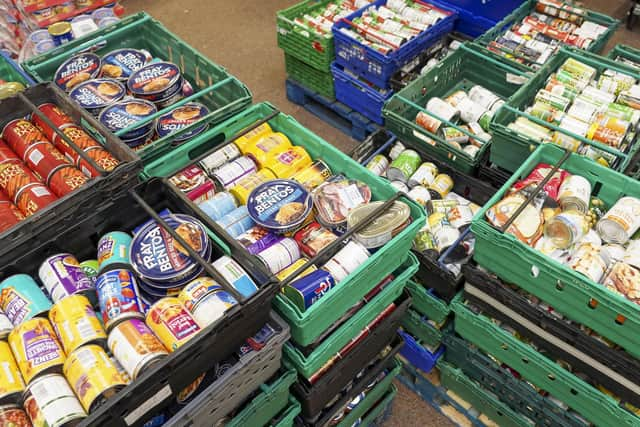'Ultra-processed' baked beans should not be shunned when the Trussell Trust warns of rising hunger - Jayne Dowle
If anything ever highlighted the crazy attitude to eating we have in this country, it’s that humble bean. Whilst food fascists tie themselves into knots over ultra-processing, the sad truth is that so many people simply don’t have the luxury of worrying about it. They are so hungry, they have no choice but to eat what is given to them.
Food charity The Trussell Trust network says it has provided some 200,562 emergency food parcels to people facing hardship in this region between April 2022 and March 2023, with 75,142 of these parcels given to children. This represents a 28 per cent increase in handouts, compared to the previous 12 months.
Advertisement
Hide AdAdvertisement
Hide AdWhen food poverty is reaching such levels, you might think that debating the morality of such a basic staple as baked beans would be a luxury. But no, not when there are points to be scored, driving a wedge ever deeper between the ‘educated’ and the rest of us.


That’s why The British Nutrition Foundation has been obliged to launch an appeal to rehabilitate the image of baked beans, surely a staple, easy to cook and still relatively inexpensive food. The organisation says that thanks to blanket warnings over ‘ultra-processed’ foods, baked beans have been unfairly demonised. And they’re not alone. That sliced wholemeal loaf you choose because it looks as if it would do you good? Forget it. It’s sliced, so it’s ultra-processed. I’m sure that we’d all like to enjoy the kind of household budget that allows for nothing but hand-raised sourdough, but at around a fiver a loaf, it’s a very rare treat – in this house at least.
The term ultra-processed applies to foods and drinks made by industrial processing, containing additives such as colouring, flavouring, emulsifiers or preservatives. It’s believed that these foods make up about half of the British diet and have been linked to cancer, obesity and heart disease, leading to calls for restrictions and taxes on their sale.
However, less than half of the British population are aware of the term “ultra-processed food”, according to a recent YouGov survey.
Advertisement
Hide AdAdvertisement
Hide AdWhen asked to identify ultra-processed foods, 50 per cent picked ready meals, 41 per cent highlighted vegetarian meat alternatives, and 32 per cent picked burgers and breakfast cereals – yes, muesli (unless homemade) is considered ultra-processed, despite all those gritty bits you think can only be beneficial, somehow.
However, only nine per cent of people identified baked beans as ultra-processed, despite the product falling into the same definition based on an internationally recognised food classification method.
Also on the unexpectedly unhealthy list are pasta sauces in jars, that staple of many a busy family, fish fingers (despite Captain Birdseye waxing lyrical about Omega 3 giving children huge smiles and super powers) and fruit yoghurts.
I’m beginning to wonder what I might have done to my kids, because all of the above formed what I assumed were relatively healthy choices for quick weekday meals when they were growing up. They didn’t have takeaways, or ready meals, just what I considered to be plain, straightforward food. Baked beans and a jacket potato? What could possibly be wrong with that? Now I know.
Advertisement
Hide AdAdvertisement
Hide AdThankfully, Bridget Benelam, a British Nutrition Foundation spokeswoman, says that we are still on safe ground: “Foods like baked beans, wholemeal toast, fish fingers or ready-made pasta sauces are an affordable way to get a balanced meal on the table quickly. These may be classed as ultra-processed but can still be part of a healthy diet.”
As she argues, we need to make healthy eating easier and more affordable, not more difficult and expensive: “Demonising all processed foods could foster feelings of guilt and stigma around food choices, adversely impacting intake of more affordable sources of nutrients.”
I agree. it’s difficult enough for many younger people, who haven’t grown up learning how to cook even the most basic dishes, to gain confidence in the kitchen.
The more complex food is made to sound, the more likely people are to shut off completely from thinking about it, opting for default solutions, such as takeaways, which so often are loaded with unnecessary calories. Surely common sense must prevail. The British Nutrition Foundation is doing exactly the right, and responsible, thing.